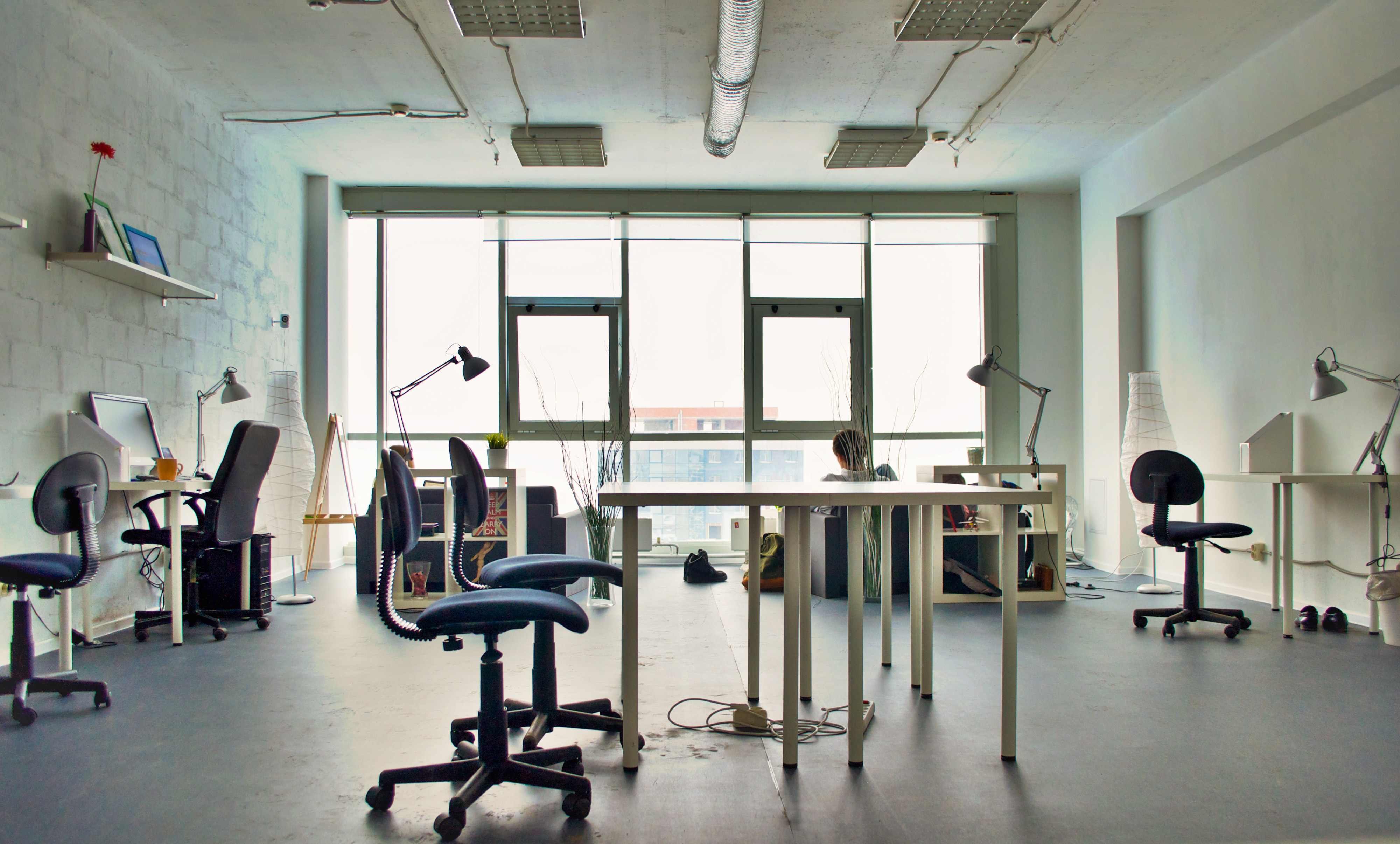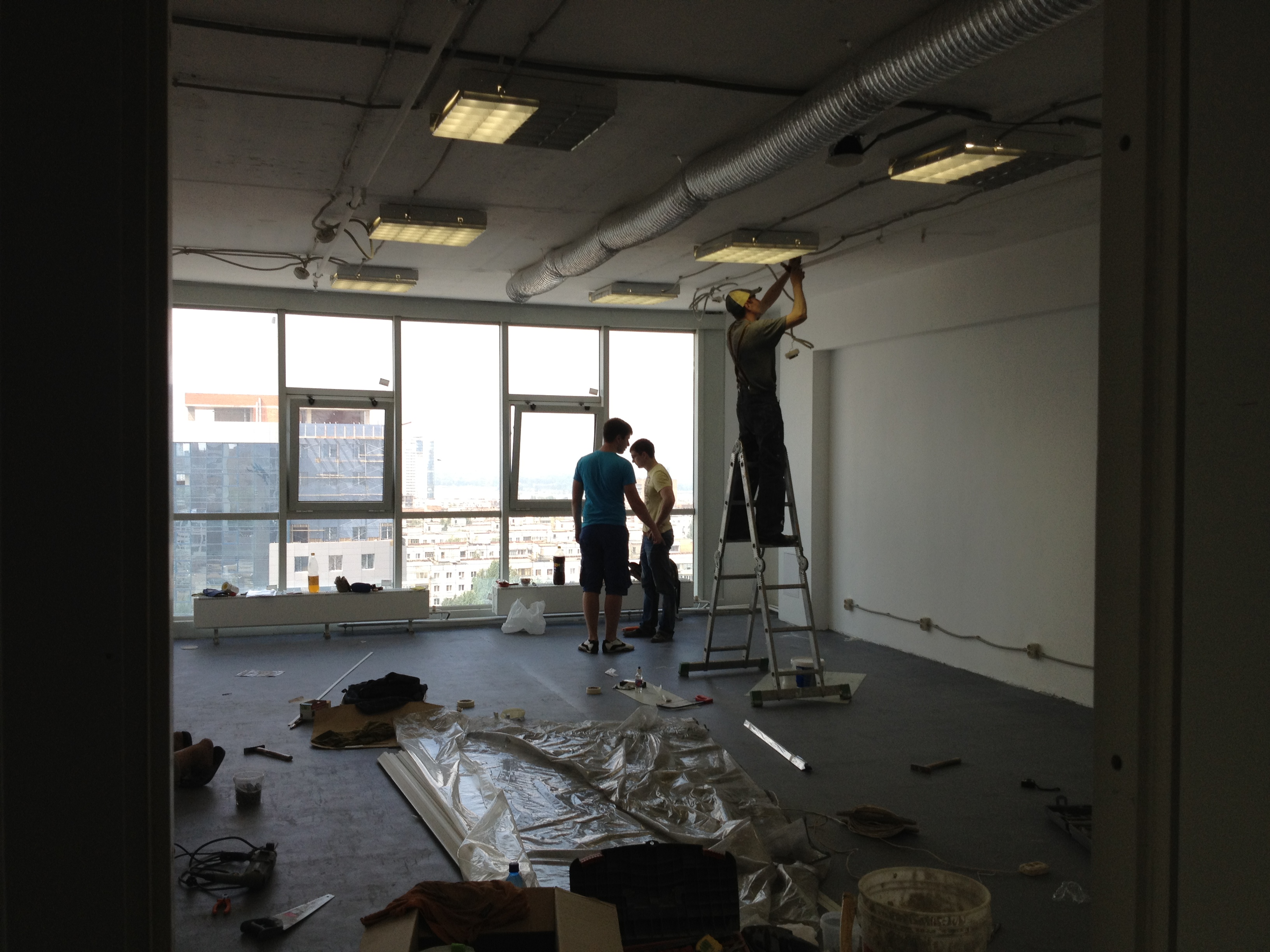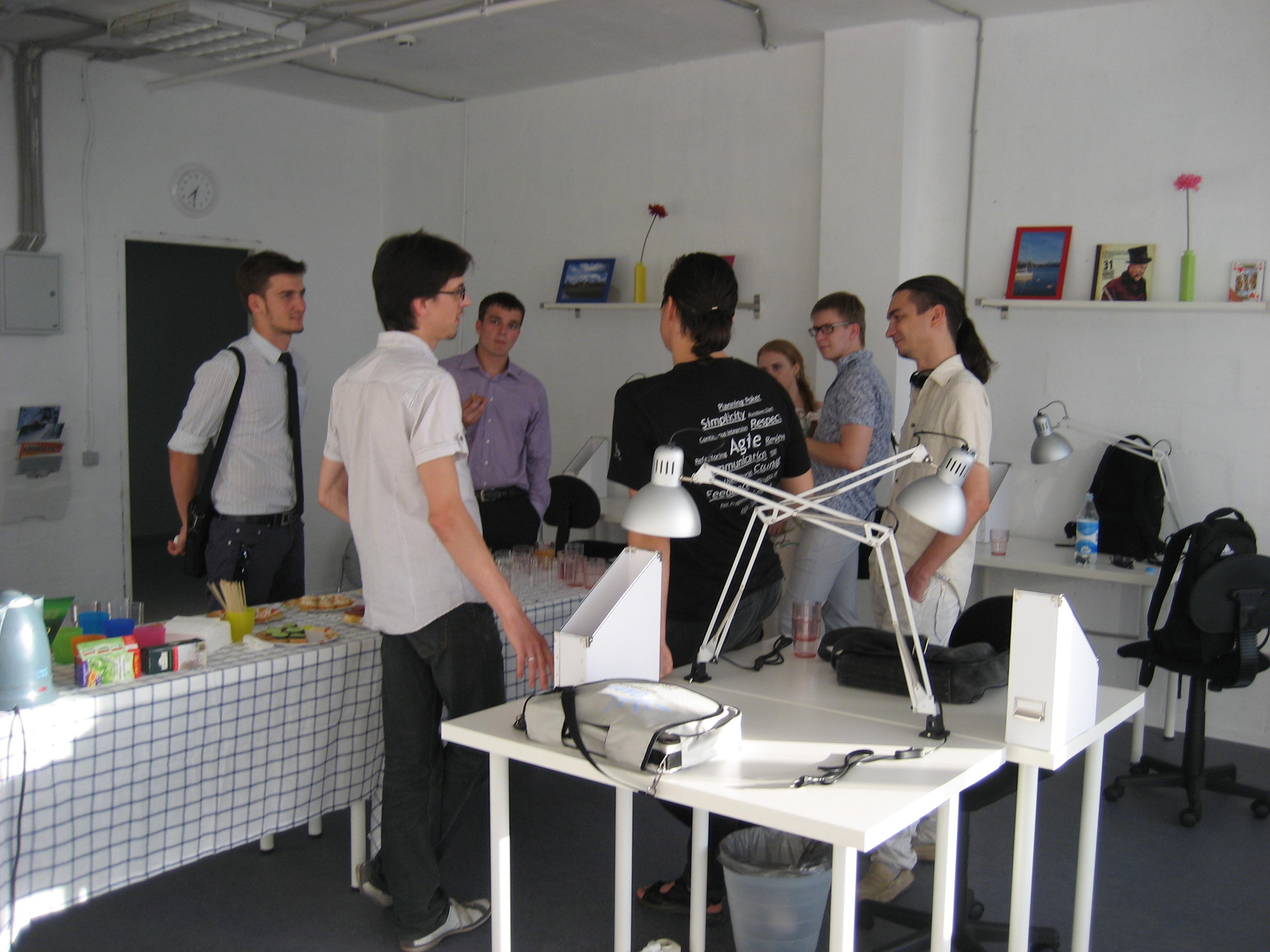Coworking in the regions - open or let others open?
My partner and I consider ourselves pioneers in the development of coworking in the regions. Our coworking appeared in Samara almost a year and a half ago. During this time, we have already managed to fill a lot of cones, rejoice at some successes, try different development paths: in general, we have gained enough experience. That is what I would like to share.

The fact is that during the work of our center I received a bunch of messages from neighboring regions asking me to tell you how things are going, whether it is profitable, whether there is a demand for our offer. Many want to repeat our feat (and by and large such projects in the regions cannot be called otherwise) in their cities, but they are afraid that the money will fly into the pipe. As an answer to all those who want to open their coworking in the province, I decided to write this post.
I would like to start with a positive. I believe that coworking in the regions has a future, and now it may be even more reasonable to open up than a year ago. All trends are slowly reaching the regions. The main thing here is to catch the moment in time. To open early means to sit without clients and earnings, to open late and the market is already so oversaturated that demand does not keep pace with supply.
We opened early, and there were certain reasons for this. By and large, we built an office for ourselves. It was uncomfortable to work at home, renting an office for one person was stupid, and there were no coworking in Samara, well, or at least I did not know about them. Having visited many coworking events in Moscow and Europe, I knew very well the value of such a place and did not understand why this topic has not yet been developed in a city with a population of more than a million people and with a tangible community of freelancers. After consulting with my Moscow partner, we decided to invest in the opening of coworking in Samara and, in addition to idealistic plans for the development and promotion of the idea of coworking in our region, to kill a whole crowd of other birds with one stone: to launch the first project in Russia (before that we worked only abroad) , launch the first project in real life (all our other projects remain online),

We found free space in a large office center on the last thirteenth floor with stunning views of the city and the Volga. In Samara, the view of the Volga is considered an indicator of prestige, and since we were guided by our own taste, I could not buy this additional advantage. The rental price was acceptable, but we completely did the repair at our own expense. The room was bare walls without electricity or plumbing, so we had to spend quite a bit at the initial stage, but we were able to make the design to our liking and equip the room as needed for our purposes, and not as it seems “right” »To the landlord. Initially, coworking was designed for 15 people, but we prepared 10 jobs with the ability to add seats as needed. Looking ahead, I will say
Hence the first advice for those who want to build a business on a coworking, and not just open an office for themselves.
Learn the demand in advance! Advertise an idea, make a website, pages on social networks, launch Yandex.Direct and wait for calls and interest. This will help to understand whether it is worth opening up at all, or if the demand in your city is not enough.
Having arranged a good opening with a buffet table and having gathered enough audience for it, we opened beautifully, but for at least another month I worked in coworking alone! People came for an hourly rental, everyone liked everything except the emptiness, but the first residents began to appear only after a month.

Tip two: arrange, if possible, with someone to rent seats in advance. The sight of an empty coworker is very disappointing and frightens off customers at the initial stage. When at least 4-5 people work, the right atmosphere is already being created.
To attract residents, we tried various types of advertising. Piles of printed flyers and posters for posting still lie in the back room. My partner and I took part in conferences as speakers, went to rallies of young entrepreneurs and IT festivals to personally present our coworking, organized free entertainment events in our territory with the expectation that people only need to see our beautiful center, and they immediately will want to become residents. Perhaps they wanted to, but they wanted to pay for it to a much lesser extent. All our offline promotion efforts have been wasted.
The residents themselves found us, it was only necessary to indicate their presence. We quickly reached the top in search engines, since we were the only coworking in Samara. Also, people willingly added to social networks. Most importantly, the Internet audience already understood what coworking is, and what it is eaten with, and those who were interested in it came to us.
In fact, in Samara, the potential customers' understanding of the essence of coworking and its advantages was an unexpected problem that we did not take into account. Unlike me, many found it more convenient to work at home and meet with clients and partners somewhere in a cafe than to go to the office every day, and even pay money for it. Now it makes no sense to list all the advantages and opportunities when working in coworking, but one thing is obvious:in the regions, the audience is less prepared for such spaces than, for example, in the capital . In connection with the above, I have a couple more tips.
Be prepared that, quite possibly, you will have to create demand in your own city, explain why all this is necessary.
And, of course, approach competently to promotion. Do not waste time and money on a mass audience, hit strictly on purpose.
With the advent of the first residents, we hired an administrator who hosted people, kept the room clean and brewed coffee! We worked from 10 to 19 so that people could come and go without any traffic jams. I began to appear there, too, more as a resident. With the advent of the administrator, expenses increased, and profits remained negative. Firstly, hours of work did not suit many. Freelancers are people who respect flexibility. Secondly, as it turned out, many are ready to pay 100-150 rubles and sit for a couple of hours to work on some task, not everyone is ready to pay 4000 per month, and even give everything at once. There were cases when people paid for a month, and then 2-3 days came and that's it. Naturally, they did not extend the lease. Many simply came several times hourly during the month and, realizing that a monthly rental would not pay off, just did not become residents. Therefore, pay attention to the following points.
Think about pricing and uptime.
With the second, everything is extremely simple - stay open for as long as possible. For example, we work from 7:00 to 23:00 without days off and holidays, but still there are those who ask to stay overnight.
But as for the price, here the approach is individual. Offer subscriptions that provide the optimum flow for your business model.If you are ready to support administrators 24 hours a day, often hold events, then the hourly model may be successful. As a result, we focused on regular customers. They handed them the keys and entry cards, canceled the packages below the weekly ones, and began to offer trial days only by prior arrangement. In addition to increasing the working time, this helped to save on the salary of administrators, and we finally got into the operational plus.
All the way to the operating payback took us 10 months. As for the return of invested funds, according to my calculations, this will happen no earlier than 3 years after opening at the current pace. I suspect that these numbers are relevant for most coworking, both large and small. At least about a payback of 3 years, I have already heard from many creators of coworking spaces, including in Moscow and St. Petersburg. Therefore, do not count on quick profits.
So, the last piece of advice for today. Coworking is a lot of money, and be prepared for it. If you just want to get money, then don’t get involved. There are many industries where you can do it faster and earn more. However, if your goal is deeper, if you want to create a creative space, a place for comfortable work, where you yourself would like to come, then go for it! You will definitely find like-minded people!

The fact is that during the work of our center I received a bunch of messages from neighboring regions asking me to tell you how things are going, whether it is profitable, whether there is a demand for our offer. Many want to repeat our feat (and by and large such projects in the regions cannot be called otherwise) in their cities, but they are afraid that the money will fly into the pipe. As an answer to all those who want to open their coworking in the province, I decided to write this post.
I would like to start with a positive. I believe that coworking in the regions has a future, and now it may be even more reasonable to open up than a year ago. All trends are slowly reaching the regions. The main thing here is to catch the moment in time. To open early means to sit without clients and earnings, to open late and the market is already so oversaturated that demand does not keep pace with supply.
How it all began
We opened early, and there were certain reasons for this. By and large, we built an office for ourselves. It was uncomfortable to work at home, renting an office for one person was stupid, and there were no coworking in Samara, well, or at least I did not know about them. Having visited many coworking events in Moscow and Europe, I knew very well the value of such a place and did not understand why this topic has not yet been developed in a city with a population of more than a million people and with a tangible community of freelancers. After consulting with my Moscow partner, we decided to invest in the opening of coworking in Samara and, in addition to idealistic plans for the development and promotion of the idea of coworking in our region, to kill a whole crowd of other birds with one stone: to launch the first project in Russia (before that we worked only abroad) , launch the first project in real life (all our other projects remain online),

We found free space in a large office center on the last thirteenth floor with stunning views of the city and the Volga. In Samara, the view of the Volga is considered an indicator of prestige, and since we were guided by our own taste, I could not buy this additional advantage. The rental price was acceptable, but we completely did the repair at our own expense. The room was bare walls without electricity or plumbing, so we had to spend quite a bit at the initial stage, but we were able to make the design to our liking and equip the room as needed for our purposes, and not as it seems “right” »To the landlord. Initially, coworking was designed for 15 people, but we prepared 10 jobs with the ability to add seats as needed. Looking ahead, I will say
Hence the first advice for those who want to build a business on a coworking, and not just open an office for themselves.
Learn the demand in advance! Advertise an idea, make a website, pages on social networks, launch Yandex.Direct and wait for calls and interest. This will help to understand whether it is worth opening up at all, or if the demand in your city is not enough.
Launch
Having arranged a good opening with a buffet table and having gathered enough audience for it, we opened beautifully, but for at least another month I worked in coworking alone! People came for an hourly rental, everyone liked everything except the emptiness, but the first residents began to appear only after a month.

Tip two: arrange, if possible, with someone to rent seats in advance. The sight of an empty coworker is very disappointing and frightens off customers at the initial stage. When at least 4-5 people work, the right atmosphere is already being created.
To attract residents, we tried various types of advertising. Piles of printed flyers and posters for posting still lie in the back room. My partner and I took part in conferences as speakers, went to rallies of young entrepreneurs and IT festivals to personally present our coworking, organized free entertainment events in our territory with the expectation that people only need to see our beautiful center, and they immediately will want to become residents. Perhaps they wanted to, but they wanted to pay for it to a much lesser extent. All our offline promotion efforts have been wasted.
The residents themselves found us, it was only necessary to indicate their presence. We quickly reached the top in search engines, since we were the only coworking in Samara. Also, people willingly added to social networks. Most importantly, the Internet audience already understood what coworking is, and what it is eaten with, and those who were interested in it came to us.
In fact, in Samara, the potential customers' understanding of the essence of coworking and its advantages was an unexpected problem that we did not take into account. Unlike me, many found it more convenient to work at home and meet with clients and partners somewhere in a cafe than to go to the office every day, and even pay money for it. Now it makes no sense to list all the advantages and opportunities when working in coworking, but one thing is obvious:in the regions, the audience is less prepared for such spaces than, for example, in the capital . In connection with the above, I have a couple more tips.
Be prepared that, quite possibly, you will have to create demand in your own city, explain why all this is necessary.
And, of course, approach competently to promotion. Do not waste time and money on a mass audience, hit strictly on purpose.
Growing up
With the advent of the first residents, we hired an administrator who hosted people, kept the room clean and brewed coffee! We worked from 10 to 19 so that people could come and go without any traffic jams. I began to appear there, too, more as a resident. With the advent of the administrator, expenses increased, and profits remained negative. Firstly, hours of work did not suit many. Freelancers are people who respect flexibility. Secondly, as it turned out, many are ready to pay 100-150 rubles and sit for a couple of hours to work on some task, not everyone is ready to pay 4000 per month, and even give everything at once. There were cases when people paid for a month, and then 2-3 days came and that's it. Naturally, they did not extend the lease. Many simply came several times hourly during the month and, realizing that a monthly rental would not pay off, just did not become residents. Therefore, pay attention to the following points.
Think about pricing and uptime.
With the second, everything is extremely simple - stay open for as long as possible. For example, we work from 7:00 to 23:00 without days off and holidays, but still there are those who ask to stay overnight.
But as for the price, here the approach is individual. Offer subscriptions that provide the optimum flow for your business model.If you are ready to support administrators 24 hours a day, often hold events, then the hourly model may be successful. As a result, we focused on regular customers. They handed them the keys and entry cards, canceled the packages below the weekly ones, and began to offer trial days only by prior arrangement. In addition to increasing the working time, this helped to save on the salary of administrators, and we finally got into the operational plus.
All the way to the operating payback took us 10 months. As for the return of invested funds, according to my calculations, this will happen no earlier than 3 years after opening at the current pace. I suspect that these numbers are relevant for most coworking, both large and small. At least about a payback of 3 years, I have already heard from many creators of coworking spaces, including in Moscow and St. Petersburg. Therefore, do not count on quick profits.
So, the last piece of advice for today. Coworking is a lot of money, and be prepared for it. If you just want to get money, then don’t get involved. There are many industries where you can do it faster and earn more. However, if your goal is deeper, if you want to create a creative space, a place for comfortable work, where you yourself would like to come, then go for it! You will definitely find like-minded people!
